Article continues below
As we waited for Ben's boat to appear, birds searched through the sandy mud exposed at low tide. The tropical sun beat down, its heat only tempered by the trade winds that skimmed across the green lagoon. Finally, a silver glint appeared along with the rooster-tail wake of a boat moving fast. Ben cut the engine at the floating wooden dock, tossing a rope to my husband, Rob, before hopping out.
“So nice to finally meet you two,” Ben said with a California accent and a big smile.
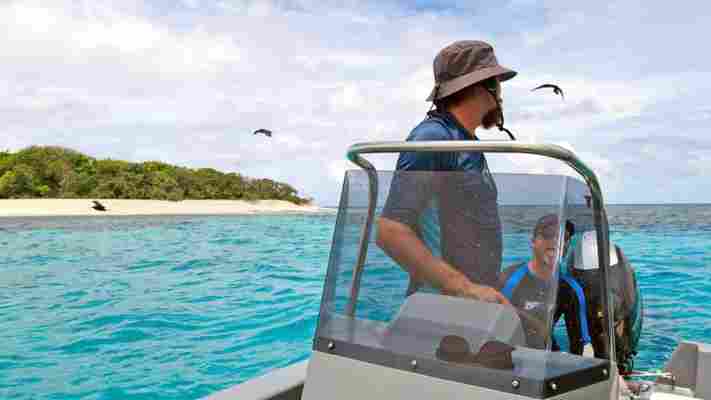
On boat ride to the island, Ben pointed out the highlights as they zoomed past (Credit: Rob Roberts)
We first heard about Ben and Lisa Newton from a fellow sailor in Tahiti. “Look them up when you get to Tonga,” she said. “The dance parties on their island are epic.”
She told us that Ben and Lisa were building an eco-resort in Vava’u, one of four states within the Kingdom of Tonga, and might be looking for seasonal help. Rob and I had been hitching rides on sailboats across the Pacific. After 11,000km of ocean passages, we were both ready to find a place to steady our sea legs.
Dancing was my favourite hobby, right up there with exploring remote Pacific islands. I Googled ‘Mandala Resort’ and sent Ben and Lisa a message through their website: ‘Would love to work in exchange for a place to pitch a tent’.
Three months later, Rob and I sailed into Neiafu, the capital of Vava’u. We wandered down the small main strip, passing an outdoor market with coconuts and pineapples heaped on folding tables. A coffee shop promised ice, laundry services and pay-by-the-hour computers. An ATM on the corner shelled out pa'angas, valued at two to every one US dollar. As we crested a small hill toward the harbour, where Ben had said to meet him, bells tolled from a white church.
On the 10-minute boat ride, Ben pointed out the highlights as we zoomed past. Fruit bats, as long as my arm and as wide as my torso, hanging upside-down from thick tree limbs on Mafana Island. The fringing reef, with waves breaking in the distance. The village of Ofu, where cows mooed next to fishing nets on the beach.
A sailboat came into view, its white outline stark against the greens and blues. “That's our baby," Ben said, pointing. “Waking Dream. She carried us all the way across the Pacific and we lived on her for nine years, all told.”
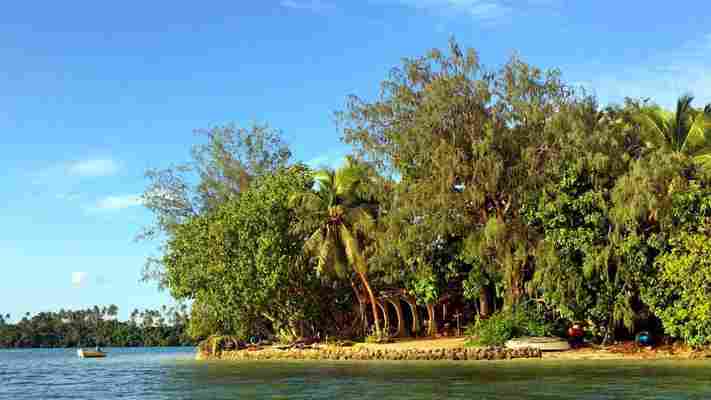
The resort blends in with the natural environment of the island (Credit: Rob Roberts)
About 200m in front of the sailboat, a tree-covered knoll crested gently out of the water; a small dot punctuating the green lagoon between two larger comma-shaped islands. As we approached, I saw a hammock strung between two coconut trees on a sliver of white beach. I guessed that it would take 20 minutes, tops, to swim around the whole island.
Lisa waved as she came toward us, her tanned limbs wreathed in dark hip-length hair and two black dogs dancing around her feet. Other than their cat, Ben, Lisa and the dogs were the tiny island’s only residents.
“Welcome to paradise,” Ben said, cutting the engine. “Its name is Fetoko.”
***
Ben and Lisa Newton knew next to nothing about the Kingdom of Tonga before dropping anchor in Vava'u in 2004, two and a half years after setting sail from northern California. They had planned to cruise on Waking Dream for a decade after selling their businesses and homes in the US.
But nothing was set in stone. As Lisa told me, “We followed coincidences and our hearts rather than the herd or the weather. Then, just as now, we believed in serendipity, and the fact that each person we met had the potential to bring something special into our lives.”
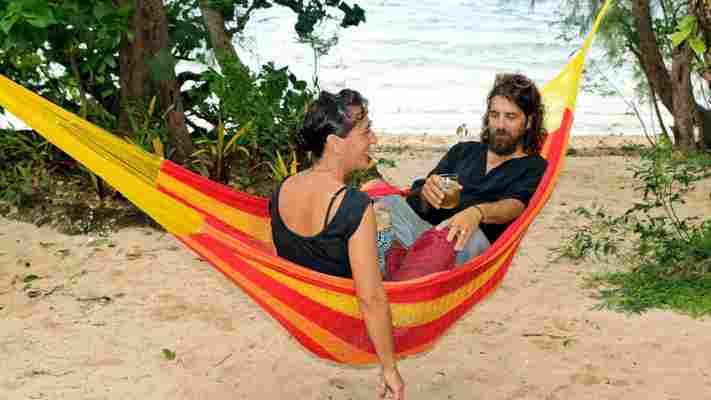
Ben and Lisa could never have imagined that they would be given an island (Credit: Amy Parsons)
When they arrived in Tonga, Ben and Lisa decided to stay for the summer cyclone season, from December through March, rather than continuing on to New Zealand or Australia like most sailors do.
That's when they met Tui, a local artist who sold intricate carvings made out of whalebones, shells and wood from his market stall in Neiafu. Like many good friendships, theirs coalesced around coffee. Ben and Tui sat together dozens of times at a table along the waterfront, spinning conversations about life, the cosmos and patterns in the universe long after their cups were drained.
“When you meet someone in another country, there's usually a cultural divide. But with Tui, we always understood each other easily. We had this amazing connection that bridged our cultural differences. Maybe because we saw the world in a similar way,” Ben said.
Born and raised in Vava'u, Tui spent nearly a decade in New Zealand before returning home to start a family. Ben and Lisa fell in love with his five young children, too, sharing meals and playing games.
After a few months, Lisa and Ben learned that Tui and his family needed help to make ends meet, and offered them a loan so Tui could keep his house.
Fetoko is a nice picnic spot after fishing the shallow waters of the area (Credit: Magenta Hyde)
Though Ben and Lisa were confident their new friend would eventually repay them, they were stunned when Tui, grateful for their generosity, offered them a small island instead of money. Coincidentally – or perhaps serendipitously – Ben and Lisa had just started discussing the idea of starting an eco-resort as they explored Vava'u's vibrant waters and its three-dozen islands aboard Waking Dream.
In the Kingdom of Tonga, land is passed down through the generations to each firstborn male. But since the red clay soil on Fetoko, a 1sqha island 3km east of Neiafu, was rocky and infertile, neither Tui nor his ancestors had been interested in developing the land or farming it. Instead, Fetoko was known by locals as a nice picnic spot after fishing the shallow waters flanking the island’s shores.
Tui offered the couple a 50-year lease on Fetoko; only Tongans can own property within the Kingdom, so palangis (foreigners) must purchase lease rights that need to be approved by the government. After many more conversations to ensure the trade was fair for both Tui and his children, Ben and Lisa accepted his gift and started the process of applying for the lease.
It can take a decade or more for leases to be approved for palangis. But by carefully following Polynesian customs, Ben and Lisa's government-issued lease came through in four years. Patience, small talk, jokes and the gift of a few fish went a long way toward cementing local relationships.
While they waited, Ben and Lisa lived aboard their boat and put their business savvy to work by opening a waterfront restaurant and offering jungle safaris on go-karts.
Through it all, Ben and Tui remained close. They'd camp out on Fetoko together, roasting freshly caught fish over an open fire while swapping dreams and making plans for what might be possible on the tiny, still-wild island.
In 2010, Ben and Lisa moved out to Fetoko, selling their businesses in Neiafu to provide the capital to start building Mandala Resort. They lived in tents or on their boat while building the first basic structures, and scaled up slowly as their budget allowed.
When Rob and I arrived in September 2013, the resort had just opened, consisting of an open-air restaurant and one fale, a charming tree-house bungalow.
The seaside fales at Ben and Lisa's resort come with a beautiful view (Credit: Rob Roberts)
“When we built the restaurant, we had to do everything ourselves,” Ben said. “It took 50,000 bags of sand, rock and concrete, and hundreds of boat shuttles from town.” He told us that 80% of the materials he'd used were sourced locally in Vava'u, and that he and Lisa had designed all of the architecture and systems from scratch.
Ben walked us around Fetoko, pointing out his vision for the fully built-out resort, which would include six more seaside fales, a yoga deck and an infinity pool. On the east side of the island, where the old coral shoreline hovered 7m off the ocean, Ben told us he was planning to hang a swing.
“We're trying to flow with nature, not just tame it. I want our buildings to mimic the curves and spirals found in the natural world,” Ben said, gesturing to the homemade sand flagstones below our feet where white shells were embedded in a wave pattern. They named their resort ‘Mandala’ after the Buddhist circular symbol representing the universe. The restaurant was full of curves, too, all round booths and swooping pillars, with nary a sharp corner in sight.
We're trying to flow with nature, not just tame it. I want our buildings to mimic the curves and spirals found in the natural world”
Everything was curved except for the cornhole boards, front and centre on the beach. Ben had introduced the simple lawn game to Tonga where it spread like wildfire among the locals. After our island tour, we broke into teams of two – Rob and Ben versus Lisa and me – tossing beanbags toward the hole in the centre of the boards while sipping gin and tonics.
It was the first of many cornhole tournaments between the four of us. Rob and I spent five months on Fetoko with Ben and Lisa. In exchange for room and board, I helped Lisa cook for the guests staying in the tree house and Rob helped Ben with maintenance. We quickly learned that managing a resort on a remote island in a developing country is hard work. It required constant creativity and a lot of patience to repair Fetoko's solar panels, rainwater catchment systems, boats and buildings.
The island's six fales are booked solid during peak season (Credit: Rob Roberts)
On the day Rob and I left for New Zealand – by then pregnant – Ben and Lisa gave us a turtle-shaped necklace carved by Tui as a parting gift. I promised them we'd be back.
***
This past autumn I booked three tickets to spend the month of February on Fetoko. Not only did I miss our friends, but I wanted our son to see Vava'u's vivid hues, free-ranging pigs and the friendly locals with their high-pitched giggles. I knew that Mandala Resort was thriving and couldn't wait to see Ben and Lisa's vision made into reality. The resort now employs a team of Tongans from the village on the neighbouring island, and its six fales are booked solid during peak season.
When I called Ben and Lisa on Skype a couple of weeks before our arrival, Lisa told me that Tui's 14 year-old daughter had just left after spending two weeks with them over Christmas. Though Tui had passed away two years earlier, Ben and Lisa remained close with his family.
The author and her family spent this February on the island with Ben and Lisa (Credit: Rob Roberts)
“It was so great having kids on the island,” Lisa said. “I hope your son likes it here, too.”
I looked over at our toddler, who had a stuffed dolphin in one hand and Tui’s hand-carved turtle necklace in the other.
“Who wouldn't like paradise?” I replied with a grin.
Join over three million BBC Travel fans by liking us on Facebook , or follow us on Twitter and Instagram .
If you liked this story, sign up for the weekly bbc.com features newsletter called "If You Only Read 6 Things This Week". A handpicked selection of stories from BBC Future, Earth, Culture, Capital, Travel and Autos, delivered to your inbox every Friday.
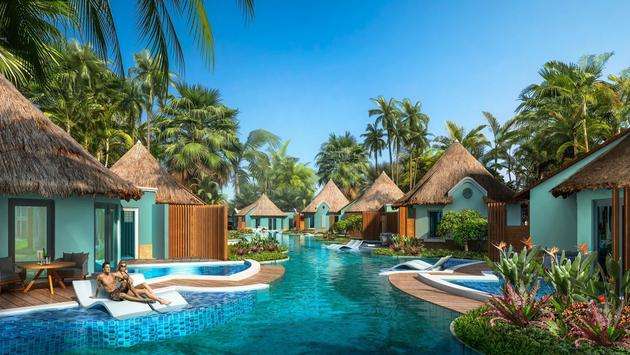
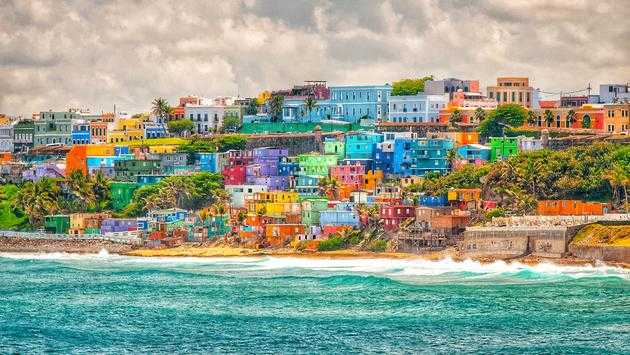
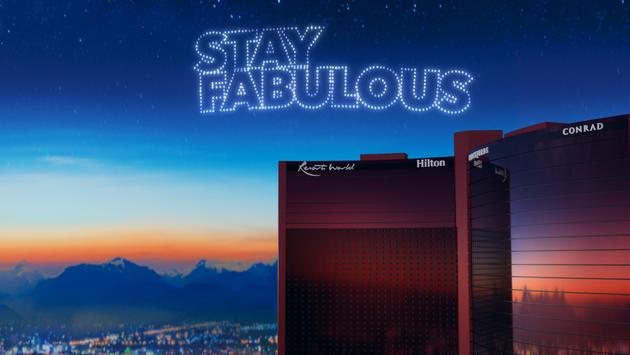
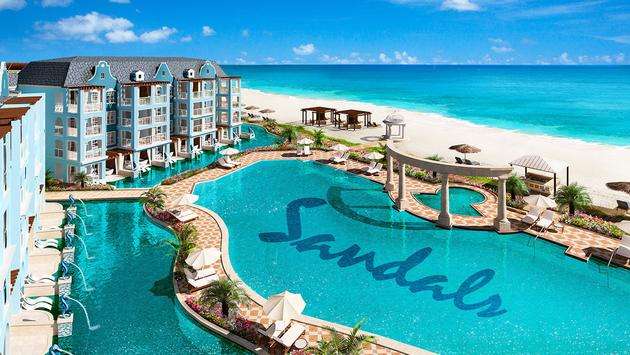
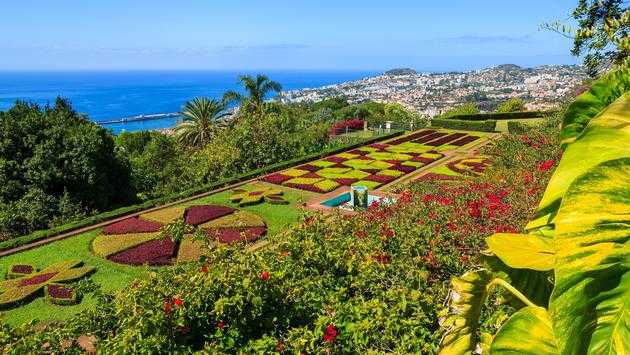

Leave a Comment